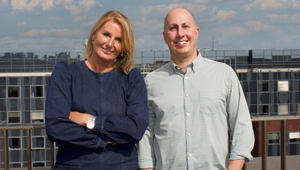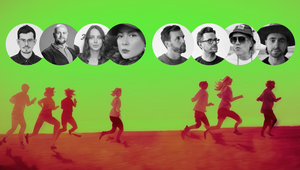
Want to Represent Queer People? It’s Complicated

I wasn’t bisexual to begin with but, then again, I wasn’t gay either. My first memory about my own sexuality comes from a playground in South Wales. Someone came bounding up to me and asked, matter-of-factly, “Jamie, are you gay?” The thought hadn’t even crossed my mind. When it did, I chased it away again almost immediately. I’d seen family members look away when two men kissed on TV, so it didn’t bear thinking about. I was normal, that sort of thing happened to people who I’d feel uneasy even talking to. Not to mention what even the slightest delay in denying my guilt would have led to on that playground. So, no. Better not to think about it.
Of course, this feeling didn’t last. It turns out the child in the playground was on to something, and slowly I began to accept that I wasn’t entirely straight. That was a difficult process, and coming out was by contrast a relief. By and large, I found a much more accepting family than I had anticipated. It was a relief to feel like I wasn’t hiding something from my friends, many of whom found out the next day in school. After a strangely enjoyable lunchtime of people – some friends, others I barely knew -- all asking the same question I’d avoided so unthinkingly in my previous school, things progressed much as they ever had. This wouldn’t have happened without gay representation in the media - especially advertising, which can reach people (like me) who wouldn’t have sought out LGBTQIA+ content on their own.
We often see coming out as the point where this confusion stops, but that wasn’t my experience. The phrase ‘coming out’ is an appropriation of the debutante’s coming out party, and can frequently still carry the pomp of this original meaning. It’s quite easy to get caught up in the celebration when you’re around the right people, and celebration is frequently what you need after many years of shame and self-doubt. Without that enthusiasm I wouldn’t be nearly so comfortable with myself, and the apathetic or even hostile alternative would have been far worse.
But it also carries some risk. I knew I was attracted to men, and overcoming the barriers in expressing that side of myself seemed a greater priority than reaching some authentic expression of my bisexuality. There is a comparative ease in being straightforwardly gay, especially when you feel like the world is against you - which is a strong enough feeling for a regular teenager, let alone a queer one. And this feeling is compounded when you realise that there are far fewer bisexuals in media than gays and lesbians.
But my journey towards bisexuality was much lonelier. I was very lucky to be supported by my friends and family, but lots of queer kids have a much harder time of it. By some estimates bisexuals make up the majority of the LGBTQIA+ community, and yet they are both less likely to come out and more likely to experience depression than gays and lesbians. They need representation just as much as gays and lesbians, but in my experience they are frequently left out.

It seems that much Pride-related marketing is borne from a desire to stand up for a persecuted minority in a clear way. In many cases this means portraying a straightforward same-sex relationship which gets directly to the point. This directness, while admirable, can lend itself to oversimplification. I did this myself while I was coming to terms with my bisexuality; for me, the best response to homophobia was direct and blunt, and in that light bisexuality felt like prevarication. I may have known that I was bisexual, but asserting and justifying my queerness seemed more important than precisely articulating my identity.
Pride marketing campaigns can frequently be caught in the same trap. But it's vital that we remember the distinct place bisexuality has in the LGBTQIA+ community, which comes with its own challenges but also its own distinct hue of pride. In my experience bisexuals are, at best, used to being ignored. The solutions are relatively simple. Make sure you’re listening to the experiences of LGBTQIA+ colleagues and ensure they’re included at every stage of the creative process. After sharing my experience with people at work, I’ve been overwhelmed by the number of people who have said that my personal experience resonated with them and the key message I learnt when embracing my bisexuality was that authenticity is crucial. Marketers should consider the whole spectrum of Pride in the work, because you’d be surprised at how relatable the experiences of even the smallest minorities can be.
Buck the trend - the more well-rounded the industry’s representation of the LGBTQIA+ community is, the more authentic the stories we tell become.
This article will also appear in ‘Spot the Difference’ an internal Wunderman Thompson zine dedicated to celebrating diversity across the EMEA region. Run for, and by, the agency’s talent, it reflects their belief that it is our differences, not our similarities, that collectively make us stronger.














